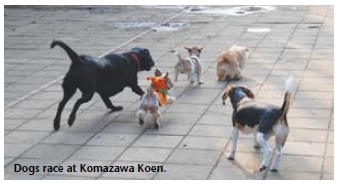Now so popular they outnumber the kids—Danielle Tate-Stratton
explains how to get in on the pet-ownership craze
Having a pet can be a great addition to your life, whether it’s in your home country or right here in Japan. The popularity of owning a pet—dog in particular, is exploding across Japan. A recent study had the pet-dog population numbering 12.5 million, double that of 1980, and dogs, most popular with the 30–40-year-old set, now outnumber children under 12!
They are often treated like the children they seem to be replacing—most dogs here are dressed better than the average person back home, and it would not be unreasonable for a Tokyo pooch to expect spa treatments (for example, F by Design f + C in Nakameguro offers clay-packs and Chinese herb hot tubs, among other services. www.designf.co.jp) or a night in a posh hotel while their humans go away (check out the ¥20,000/night rooms at Narita Airport’s new Pet Inn Royal, tinyurl.com/33lw6h). Some pets travel around in Gucci totes, are wheeled around in baby-worthy buggies, and even sport designer haircuts and colors!
As with so many aspects of life in Japan, some things are fun to incorporate into the routines we bring from home, but sometimes, we just need to know what the rules and regulations are for living here! With that in mind, we’ve compiled the basic guidelines regarding importing, buying, and registering pets in Japan, and have thrown in some ‘just for fun’ information on wining and dining your pooch as well!
Bringing Your Pet Into Japan
For some families who move to Japan, their accommodation here is such that a pet is a viable option. This is great news for anyone who already has a four-legged member of the family! Unfortunately, bringing the family dog or cat into Japan isn’t as easy as simply booking their crate a space on the plane!
A main concern in Japan is rabies, so the import procedure varies depending on whether or not you are coming from a designated area (rabies-free zone). If you are and fulfill all other requirements, quarantine can be completed in 12 hours. If you come from a non-designated area, your pet will either have to undergo a 180-day pre-export stay, or a quarantine of that length once you come into Japan.
All pets need a 40-day advance notification form, to be sent to the authorities in Japan, approved, and then sent back to you before you board the plane (Fido won’t be allowed on without it). Additionally, you need to make sure your pet is micro-chipped, posseses a certification of immunization against rabies, has an anti-body measurement test over a 180-day period (to make sure it has developed an immunity to rabies), and a country of export certificate. Of course, regulations vary depending on where you are coming from, what sort of animal you have (crocodiles, for instance and not surprisingly, require special permission to be kept as pets!), and a host of other variables.
What’s This About Microchipping?
Microchipping is a requirement for all pets coming into Japan, but even for ones born and bought here, it’s a very good idea! Microchips are a small implant, about the size of a grain of rice, which are put just under the skin of your pet. (In dogs it’s usually on the back of the neck.) The chip is connected to a unique code, which can be used to identify your pet should it escape and lose its collar. In Japan, this is an especially good idea as lost dogs, according to Animal Ark (see right), are only given three to five days at a holding center before being sent to the gas chambers. If your pet strays far from home, having the ability to track you down without the help of registration tags can literally be a lifesaver! There is a national registry in Japan, and once your vet implants the device (it’s quick, nearly pain-free, and non-urgical), you can pay to become a part of that database. To read more about microchips, visit tinyurl.com/26c99c.
Fifi Needs to Register at the Ward Office Too—Legalities of Owning a Pet in Japan
As with most places, dogs need to be registered here in Japan. You can register your family’s new addition at the ward office where you live, and this must be done within 30 days of you becoming the owner. Your dog only needs to be registered once, but should circumstances change (for instance if the dog changes owners, dies, or you move), then the ward office needs to be notified.
In Japan, your dog is required to have a rabies vaccination every year, and the vaccine must be done between April 1 and June 30. If the dog you purchase is over 91-days-old, you must have its first rabies vaccine done within 30-days of you purchasing it (you can register it at this time as well). In many areas, there are open vaccine days in April and early May where you can have your dog vaccinated in front of your ward office or in certain parks. Watch out for these times in newspapers, or look for the notification postcard sent out to certain areas. Once you get your dog vaccinated, the vet will provide you with a certificate. Take this to your ward office, pay a nominal fee, and get reissued with a yearly rabies tag. Your dog must wear the rabies and registration tags on its collar at all times.
With cats, things are a little bit more straightforward. Cat-owners are required by officials “to keep the cat in such a manner so as it won’t disturb other citizens.” Essentially, that means keeping your cat in a house, fixing your cat, and making sure that it is wearing a collar with an identifying name and address.
When pets pass away, it’s undeniably sad for the whole family, but your ward office can help you with arranging for proper disposal. Options vary depending on your location, but can range from cremation to burial.
Petless in Tokyo?— Play with a Pet and Do Some Good!
For many people here in Tokyo, having a pet is impossible due to the size of their apartments and prevalent rules against having a pets in rented homes. Luckily, there is a great way to not only play with deserving animals but to help out a worthy cause as well. Animal Ark Kansai is a shelter in Osaka-fu (with an office in Tokyo), which works to rescue, care for, and then re-home abandoned and otherwise in need of a new home animals. They are mostly dogs and cats, but other creatures show up on the Ark’s doorstep from time-to-time as well. The unfortunate truth is that while pets in Japan can almost be treated better than the children, according to Animal Ark’s extensive English-language website, the pet shop business in Japan operates on a 10–20 percent turnover. Essentially, this means that they make a profit from selling about 10–20 percent of the animals, while the remaining 80–90 percent that are un-saleable are ‘disposed of’. Disposal methods include euthanasia, being sold to experimental labs, and going to the hokensho, or gas chambers. Pet stores also make it easy for owners to abandon old dogs, with some having boxes where you can leave your old dog outside before going in to buy a new one.
While the situation can seem bleak, organizations like Animal Ark do a lot to help, and you can too — the Ark is always looking for volunteers to help with fundraising and promotion, as well as hands-on care. As a bonus to volunteers, Animal Ark covers the costs of your accommodation if you come to volunteer for more than a day. Jobs you may be assigned include: grooming, socializing, dog walking, giving medical checks, and cleaning or feeding.
For families who are able to have a pet at home, adopting one of the Ark’s animals is a responsible way to obtain a pet. Expect to visit the center and have an interview with the staff to ensure that you and your new pet are mutually suited to each other. For more information about the pet industry in Japan, the work Animal Ark does, and to browse through the incredibly cute profiles of dogs and cats up for adoption, visit www.arkbark.net.
Pet Sitting—At Your Place, Not Theirs
It can be stressful for your pet to go to a kennel, but for expat families who travel back and forth to their home countries or for work several times a year, sometimes finding a place for your pet to stay can be hard. Luckily, Cat’s Paw Petsitter offers in-home (and in English) pet sitting for your dog and cat throughout Tokyo and into parts of Kanagawa, Chiba, and Saitama. Services include walking, brushing, feeding, etc. Visits last about an hour, and start from ¥2,500. Visit www.k5.dion.ne.jp/~catpaw/english.html for more information and to set up a booking.
Wining and Dining with Fido
Once you have your pet, they’ll want to join in with your daily activities as much as possible—here’s one way to do that! It’s no secret that in Tokyo, eating out is a wildly popular activity! Some estimates say that there are 80,000 places to eat in the 23-ku region alone. In Japan, whether or not your pooch can come into a restaurant is up to the manager, so some might be OK with your dog on the patio or at your feet, but there are several restaurants that take doggie-dining to another level by actually catering to you and your pet! Largely concentrated in the Daikanyama area, these cafes often feature dog-friendly menu items, designer pet stores, outdoor terraces, and the opportunity for your stylin’ pup to be seen around town.
Don’t worry about your dog being relegated to kibble when you dine out—these cafes are geared towards high-class doggy dining! For instance, Deco’s Dog Café offers items such as the chicken roll with veggies and cheese—for both of you! (The dog-friendly version is designed for easy digestion.)
Next time you fancy a Saturday-afternoon outing of shopping and lunch, consider visiting one of these cafes and taking your furry friend with you! Even if you yourself don’t have a dog, visiting one of these cafes would give you the perfect opportunity to be around lots of pooches, and if you ask nicely, maybe even play with one of the canine diners!
Deco’s Dog Café
11am–11pm
Tel. 03-3461-4551
www.hot-dog.co.jp
Dogs of all sizes OK, dogs can go inside, water service, dog menu.
Dog Yard Café
11am–8pm
Tel. 03-5728-6711
www.birdie-net.com
Dogs of all sizes OK, dogs can go inside, terrace, water service, dog menu.
Pet owning in Tokyo, despite its difficulties with space constraints and registration regulations, can be a lot of fun once you factor in dressing up your pet to the nines and heading to the dog park (check out Yoyogi Koen and Komazawa Koen for great off-leash areas) to check out the latest in doggy fashions. Have fun spoiling your pet—it’s never hard to do with all of the clothing and accessory shops around town! For instance, check out Pet Forest (www.petforest.co.jp) for your basic food, grooming, café, and yes, frivolous pet clothing needs as well, and have fun experiencing this great city with your four-legged friend!










